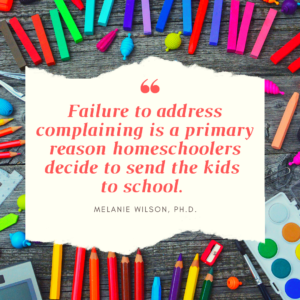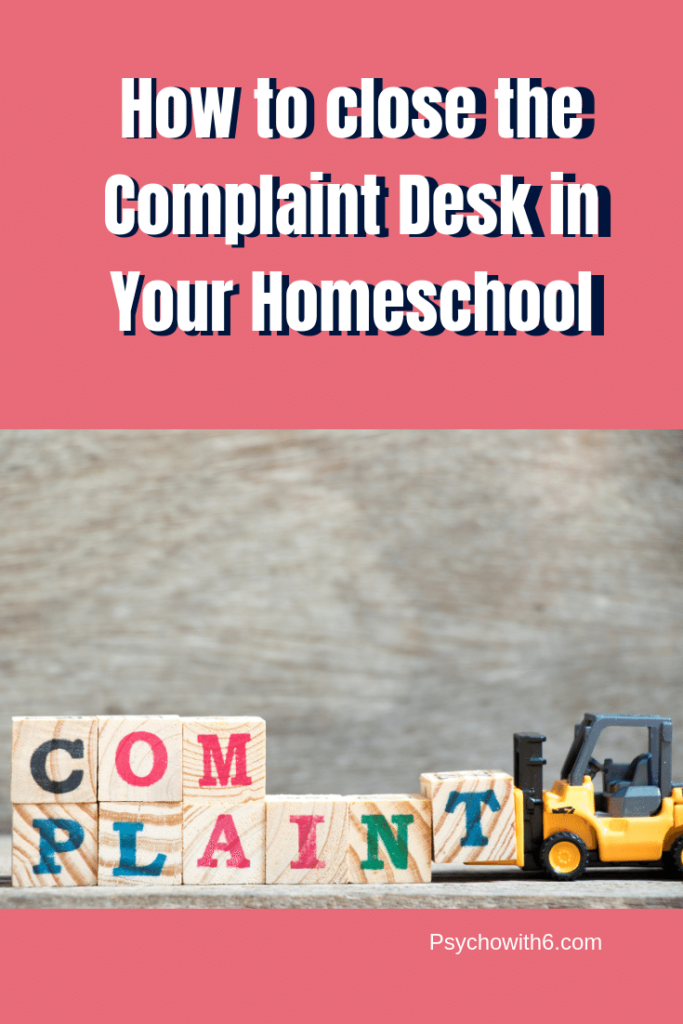
Are you dealing with complaining when it’s time to start school, or time to do chores, or time to do anything your kids don’t like to do? If so, you will want these six ideas that will result in a complaint-free homeschool.
Why close the complaint desk in your homeschool
Before I give you the how, I have to share the why. Why should we work to stop complaining from our kids?
First, if you don’t address complaining in your kids, you will be miserable. Few things are as discouraging as being criticized or hearing grumbling after you have spent time and energy and money on your kids. In fact, not addressing complaining in kids is a primary reason why homeschoolers decide to send the kids back to school. We need positive feedback for the hard work we are doing, and even if we can’t find that in our kids, we certainly don’t need to be verbally beaten down by the very people we are sacrificing for.

The second reason we have to deal with complaining in our kids is because complaining people are not fun to be around. If you don’t help your children beat the complaining habit, they may find it difficult to find spouses or may have difficulty maintaining a happy marriage. They may have difficulty holding a job. They may have difficulty maintaining friendships. No one likes a complainer.
The third reason we must deal with complaining is because God commands us not to complain. We are not doing our God-given parental duty if we allow our kids to disrespect us, God, and others with complaining. Philippians 2:14 says to do everything without complaining or arguing. And Colossians 3:17 says, “And whatever you do, whether in word or deed, do it all in the name of the Lord Jesus, giving thanks to God the Father through him.”
How to close the homeschool complaint desk in your homeschool
I hope that I have convinced you that nipping the complaining habit in the bud is a worthy endeavor. So how can we close the complaint desk in our homeschool?
Do a Bible study on complaining or gratitude
The first way to deal with complaining is to begin a Bible study on complaining or gratitude. I like the Bible study on contentment you can find at NotConsumed. God’s word does not return void. As part of your Bible study, have your children memorize verses having to do with complaining and gratitude. My favorite Bible memory program is Memlok that uses pictures to prompt memory.
Pray with gratitude daily
The next strategy for closing down your complaint desk is to have your children pray with gratitude daily. In doing this for many, many years, gratitude has become a habit in our home. I always ask my children to thank God for something in our prayer time. I also participate. The key to making this effective is to not criticize what your child says. It’s okay if your child is thankful for a pet or thankful they don’t have to do schoolwork in a certain subject. We want them to be habitually thankful.
Be indignant when a child complains
The third strategy for closing down your complaint desk is to use indignance when a child complains. Numbers 11:1 reads “And the people complained in the hearing of the Lord about their misfortunes, and when the Lord heard it, his anger was kindled.” Let’s be clear: Complaining is disrespect. When your children complain about a meal, how long something is taking, or about doing school, they are demonstrating their disrespect for you. This third strategy is not flying into a rage over that disrespect, but it is absolutely communicating a no-tolerance policy.
My mother used to give me the look. I called it the eyeball bulge. I have given my kids a look too to communicate that their complaining was unacceptable. If you don’t have a scary look, it is acceptable to be indignant. I have said things like, “I spent a lot of time making this meal, preparing this lesson, taking you to this place, and I deserve respect and gratitude.” We don’t want to lay a guilt trip on our kids habitually, but when complaining happens, you are within your rights to play the guilt card. I have talked honestly about what I have sacrificed for my kids. Getting complaining in return is insulting.
Use logical consequences
A fourth strategy for closing down your complaint desk is to use logical consequences. You hope that indignance will shut down the complaining. but if it doesn’t, it’s time to use corrective action. If your child complains about a meal, it’s taken away. Your child can make his own meal. If your child complains during an outing, you either go home immediately or the child forfeits the right to attend the next outing. If your child complains about a chore, another chore is added to his list. If your child complains about her schoolwork, more work is given. For this last one, be sure to read the article I wrote on dawdling homeschoolers. It may be that your child really does have too much work. In that case, don’t pile on even more. Whatever you do, do something to demonstrate that you won’t tolerate the complaining. If you don’t, your child will think she can control you with her complaints and she will be right.
Teach your child that there is a God-honoring way to ask for change. Your child should begin by expressing gratitude and a willingness to obey. Let’s say your child doesn’t like the bread your sandwiches are on. Your child could say, “Thanks so much, Mom, for making lunch. Do you think we could try French bread for sandwiches sometime?” Or, let’s say your child doesn’t want to do chores now. Your child can say, “I know you want me to get the lawn mowed. Would it be okay if I started after I finish this game?” Instead of your child whining and saying, “Can we go?” repeatedly when you’re out somewhere, your child could say, “Thanks for taking us, Mom. Do you have a time when you expect to leave?” Or your child could say, “I was hoping to spend some time with my friend when we get home. Do you know when we will be leaving?”
Use a complaint jar
A fifth strategy for closing down your complaint desk is to use a complaint jar. Every time someone in the family complains, that person has to put money in the jar. Some jars have labels that read, “All complaints must be written on dollar bills $1 or larger.” The money collected can be donated to a charity of your choice. Alternatively, you could have the complainer write out something they are grateful for in the situation and add their note to the jar. Try a Complaint or Compliment Box. Or, take the Complaint-Free Week Challenge.
Have your kids serve others
Finally, you can shut down your complaint desk by having your kids serve others. A mission trip where kids work with families who live in poverty is very effective. But having your child serve others in your family, church, and community is also effective. I have found that my kids who lead younger children in Vacation Bible School learn how challenging it is to be a parent. Teens who work in service industries learn how painful complaints can be. As a result, they learn humility and to be kind to those who are serving.
Conclusion
You can put an end to complaining in your home and homeschool when you recognize how destructive complaining is to you and your child. First, begin a Bible study on contentment and gratitude. Pray with gratitude daily. Use indignance when complaints occure. Enforce a no-tolerance policy by giving logical consequences for complaints. Try using a complaint jar and give your child plenty of opportunities to serve others.








Thank you for this! So very helpful! I will be applying these principles as we start the new homeschool year tomorrow~ May God bless you!
You are welcome! Blessings on your new school year. <3